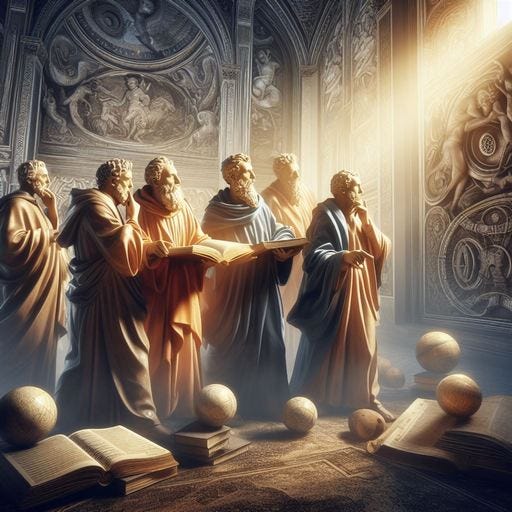What Is Truth?
While we "see through a glass darkly" we can do a better job discerning truth from error.
The anniversary of the 9/11/01 terrorist attacks was a little more than two months ago. I always feel melancholy on the anniversary of that terrible day. I don’t personally know anyone who died as a result of the attacks, but for some reason it’s a sad day for me.
I think this year I felt more melancholy than usual. As I scrolled through the “X” aka Twitter, it seemed there were more 9/11 Truthers out there than usual. I don’t even know if they go by that name any more, but there they were, claiming building 7 was a controlled demolition, as were WTC Towers 1 and 2, and that Bush knew in advance, and the Pentagon was hit by a missile etc... - all the usual garbage that has been debunked over and over and over again. Yet more people seem to be falling for the nonsense than before. Of course there seem to be more flat-earthers around too so perhaps I shouldn’t be surprised.
There are a million different conspiracy theories floating around these days. There’s nothing new about that, but I do think social media helps the spread of these things. I don’t want to get into an argument about “both sides-ism” but it is true that both sides of our political coin have their pet conspiracy theories and cling to them like a warm blanket on a cool autumn eve.
All of this made me think about Pontius Pilate’s famous question to Jesus. “What is truth” he asked, without waiting for an answer. If you’re a Christian, Jesus already answered it in John 17:17 when he said “your (God’s) Word is truth.” I believe this to be true, and as a Christian myself, I take comfort that there is absolute truth. Even you and me, limited as we are in our capacity to fully comprehend Almighty God, can understand truth to a certain degree. The scriptures further say in 1 Corinthians 13:12 “for now we see through a glass, darkly; but then face to face...” One day we will have the ability to understand all that is true, but not necessarily while we’re here on this earth. Some things will always remain a mystery.
My Father went to be with the Lord seven years ago. He remains the smartest human being I’ve ever known, although I’m blessed to have some friends who come pretty close. My Dad earned a Ph.D from Cal Tech, perhaps the finest engineering school in the world. His Ph.D was in “Applied Mathematics, Classical Elastostatic and Elastodynamics, Continuum Mechanics, and Fluid Mechanics” I understand those are words of the English language, but string them together and you’ve lost me. He pursued truth in engineering, and in his walk with God. I imagine him in heaven right now, chatting with Einstein or Newton, and quizzing God on how it all works. He no longer sees through the glass darkly. He knows the truth.
I delivered a commencement address a couple of years ago to a group of graduating homeschool students. They were all going to college to pursue this or that subject of interest to them. I of course lauded them for their accomplishments thus far, and encouraged them to work hard to obtain their college degrees understanding they will likely have to overcome obstacles. But I also challenged them to pursue truth. Not the kind of “truth” found on some strange YouTube channel with fifteen subscribers, but truth rooted in reality, that has stood the test of time, that will continue to endure long after we’re all gone. Those are the truths that matter.
I think this is what were missing in American culture right now - especially in our politics. We’ve forgotten so many things we used to know, so many of those truths that have stood the test of time, and we need to learn them again. Tom Wolfe called this the “Great Re-learning.” We need one of those again.
What then is truth you may ask, as Pontius Pilate did so many years ago. Philosophers and Theologians of all religions have wrestled over for as long as there have been Philosophers and Theologians. I’m neither a Philosopher nor a Theologian, but I do think there are some tools we can use to help us navigate the “post-truth” world we seem to be living in. Here are a few that I use to help judge whether something is true or not.
Remember Hanlon's Razor: “Never attribute to malice that which can be adequately explained by neglect, ignorance or incompetence.”
Remember Occam’s Razor: “Explanations which require fewer unjustified assumptions are more likely to be correct” or more commonly expressed as “the simplest explanation is usually the best one.”
If it sounds too good to be true, it probably is.
When news breaks, be skeptical of initial reports - even from your most trusted news source.
If a news story neatly conforms to what you expect to happen, dig deeper because you might have missed something.
John the Baptist was a “voice crying in the wilderness” but the guy on the internet claiming to know things nobody else does is probably just a weirdo.
Remember that people are terrible at keeping secrets, so conspiracies that require dozens, hundreds, or thousands of people to keep their mouths shut, are probably fake.
Remember that there are very few truly, completely evil people in this world who are beyond redemption. Your neighbor who voted for the “other” candidate probably isn’t one of them.
Remember that politicians are flawed humans beings just like you, and our system of government was never designed to let a single politician fix everything.
And finally, have the humility to admit you might be wrong.
These tools won’t unlock the mysteries of the universe, but hopefully they’ll help us all do a better job discerning truth from error.



